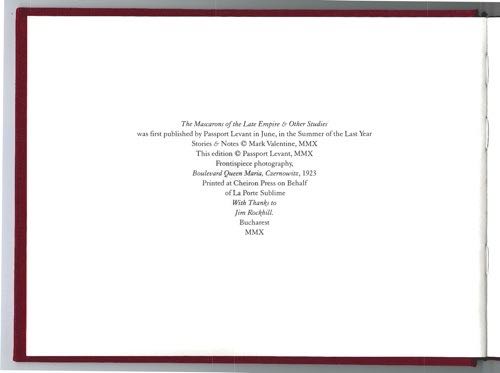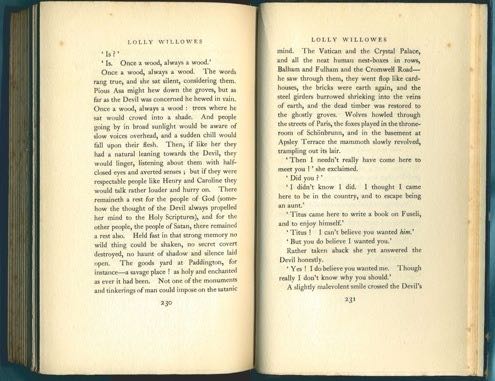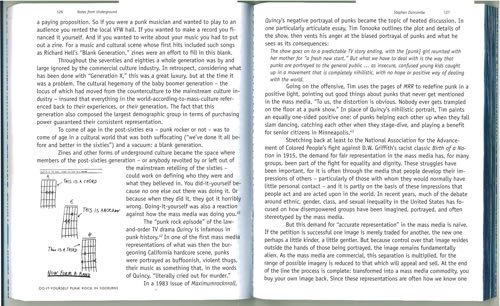
September 2010
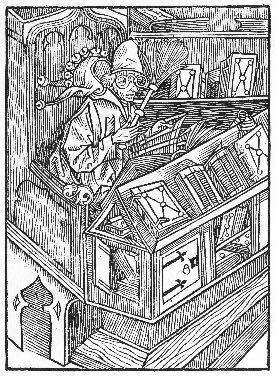
In the Woods
Birch bark has fascinated me since childhood. It will serve as a writing material, and the natural markings of the outer and inner bark seem to stand at the threshold of meaning, only I am lacking only sufficient imagination to read what is written there ; it is also famously combustible.

— Henry Abbott. The Birch Bark Books of Henry Abbott.
Sporting Adventures and Nature Observations in the early 1900s .
Edited with an introduction by Vincent Engels (Harbor Hill Books,
1980). Adirondack Bibliography (1956) 7236 & Supplement (1973),
p. xxxiv ; Litchfield sale (Sotheby’s 29 November 2001),
lot 1.
The Birch Bark books are little books given as gifts by Henry Abbott, New
York watchmaker, inventor, and advocate of standard time zones, between 1914
and 1932, and they form a unique record of his love of the Adirondacks and
his many years spent there. They are wonderful tales of being in the woods
with eyes and ears open. Unhurried, often whimsical, effortlessly digressive : Psychology
of the Lost (1930) is brilliant, and The Chief Engineer (1920),
about a beaver dam, is another of the best. Complete sets of the originals
are rare ; the Litchfield sale was the first time I ever saw a complete
set (two sets are recorded in institutions, and I have since seen two others
in private collections) ; the collected edition can easily be found,
has an excellent biographical introduction (with a moving episode not found
elsewhere), and conveys much of the charm of the individual stories.
I really love these little books, and they have long been a favorite of the Endless Bookshelf.
Recent reading :
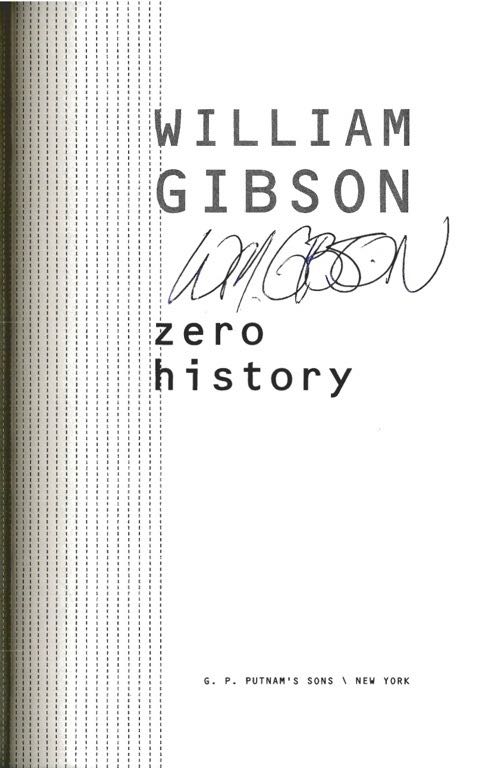
— William Gibson. Zero History. G. P. Putnam’s Sons, [2010]
“ Sometimes, ” Hollis said, “ I think something about Bigend condenses things, pulls them together . . . ”
“ Reg, ” said Heidi, drawing the dart’s black tip perilously close to her eye, “ just says Bigend’s a producer. The Hollywood kind, not the music kind. A giant version [. . .] but without the hassle of having to make movies. ”
A delight, a deft prose style moving beyond the restrictions of plot. Went to his sole New York appearance last week with friends, to hear Gibson read — what a funny writer and reader he is — and to meet the author (briefly) during the signing afterwards. Though we had corresponded in years past, our paths had never before crossed in person (see below).
The most interesting point Gibson made during his talk (following the reading) was that the chief villain in his novels is really “ the world as it is ”. It was also instructive to hear him transform an unsually phrased query from the audience into an means of broader scope, to answer the question he might like to have been asked.
Souvenir
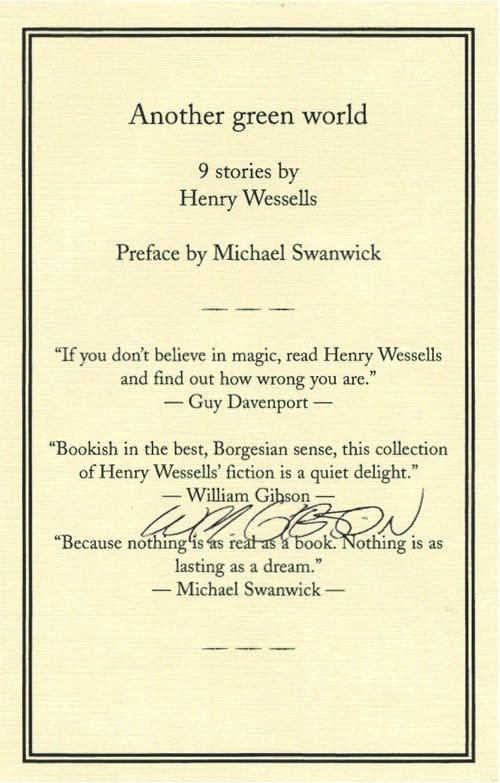
Seattle Book Fair
Your correspondent will be exhibiting books at the Seattle Antiquarian Book Fair next week in the Seattle Center Exhibition Hall, north side of Seattle Center (on Mercer St just east of 3rd Ave N). Come say hello, under the sign of James Cummins Bookseller, in Booth H.
‘ to laugh at the tyrant’s vigilance ’
— William Godwin. [Things as They Are ; or, the Adventures of] Caleb Williams , [1794 ; Oxford University Press, Oxford World’s Classics paperback, 2009]. Edited with an Introduction and Notes by Pamela Clemit. This book had long been on my list of Books to Be Read, and after looking at the original edition in the Pforzheimer collection, I was inspired to put it at the top of the list.
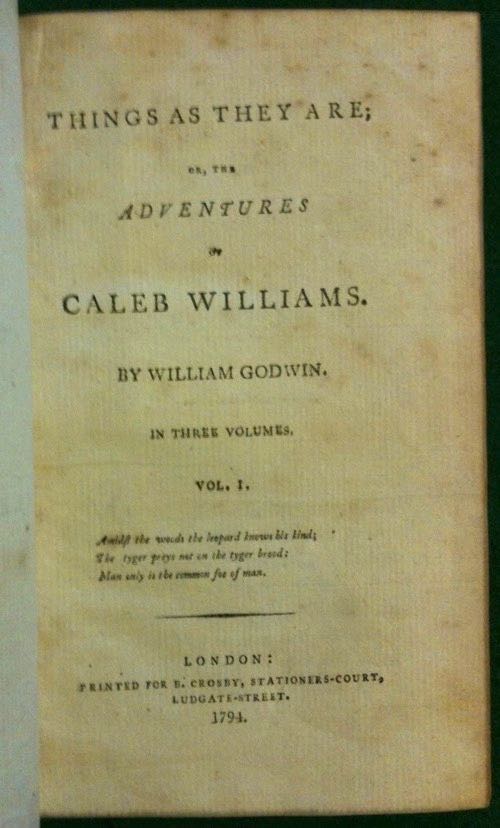
The novel is relentless in its pacing, and utterly modern in its concerns : the predatory abuse of the law by the wealthy classes of England. “ Wealth and despotism easily know how to engage those laws, which were perhaps at first invented [witless and miserable precaution !] for the safeguards of the poor, as the coadjutors of their oppression. ” It is also a powerful demonstration of the corrosive power of hatred, for Caleb Williams and his sometime patron turned persecutor Falkland are each destroyed by the consequences of the endless animosity.
The fact that there were four French translations of the novel during the 1790s prompts me to wonder if Dumas read the novel, for the reflections of Caleb Williams whilst he is imprisoned prompted me to think of the dynamic of the education of Edmond Dantès and how he acquired his superhuman powers during his imprisonment on the basis of a false accusation, — and how he too escaped from his prison.
Godwin’s narrative is flexible enough to encompass philosophical asides and epigrams : “ The mind is its own place; and is endowed with powers that might enable it to laugh at the tyrant’s vigilance. ”
The narrator hits upon the notion of writing his story in a book as the surest means of outwitting Falkland : “ How impotent are the precautions of man against the eternally existing laws of the intellectual world ! . . . He may hunt me out of the world. — In vain ! With this engine, this little pen, I defeat all his machinations . . . ”
In Godwin’s preface to the novel, removed by the author from the first edition at the suggestion of the publishers, he writes succinctly, “ It is now known to philosophers, that the spirit and character of the government intrudes itself into every rank of society. . . . a truth highly worthy to be communicated to persons whom books of philosophy and science are never likely to reach. ” A pretty clear argument for the importance of the novel as literary form in the history of ideas.
Some of the boldness of incident and form of the narratives of Caleb Williams may come out of the Gothic mode, but Godwin explicitly rejects any supernatural explications of the omnipresent malevolance of Falkland :
Soon after, Godwin describes the “ hurricane of the mind ” Williams experiences when he finds a copy of the Wonderful and Surprising History of Caleb Williams in the remote village. It is the same popular account that drove him from London, and he understands that his troubles will continue.It is Falkland ! In vain, I said, Mr. Falkland, wise as he is and pregnant in resources, acts by human and not by supernatural means. He may overtake me by surprise and in a manner of which I had no previous expectation; but he cannot produce a great and notorious effect without some visible agency, however difficult it may be to trace that agency to its absolute author. He cannot, like those invisible personages who are supposed from time to time to interfere in human affairs, ride in the whirlwind, shroud himself in clouds and impenetrable darkness, and scatter destruction upon the earth from his secret habitation. [. . .] I was little better than a man distracted between the incoherence of my ideas to my present situation excluding from it the machinations of Mr. Falkland, and the horror I conceived at the bare possibility of again encountering his animosity . . .
‘ That disruption leading to discovery . . . ’
— Tom La Farge. Writhing Machines No. 3 : Echo Alternators . Proteotypes, 2010.
The latest instalment in the series of monographs on inventive constraints and creative tools, playing with formal variations on echo and repetition and drawing upon La Farge’s wide ranging and brilliant reading of sources from Swift and Thoreau and Roussel to the Fououcault and Oulipo and para-oulipians and contemporary writers. The poetic forms are clearly described with startling and often funny examples. To read La Farge is an education, as, for example, in his discussion of the method of composition described by Raymond Roussel in How I Wrote Certain of My Books , of working with phrases bearing two contradictory (or different) meanings. Where La Farge goes next with his discussion is fascinating : he steps from Roussel to passages in the final chapter of Walden , “ No wonder that the earth expresses itself outwardly in leaves, it so labors with the idea internally. ” Thoreau traces the movement from lobe and labor to leaf and wing. La Farge writes,
Thoreau wants to suggest idealist unity, a vision of the world as architected, unified, its members linked by their common origin ; in effect and enormous hieroglyph. But Roussel was interested in breaking up the world, not joining it, exploring differences by using etymologically related words to fan out across the world. . . . Roussel is the great poet of slippage, a sort of anti-Thoreau.
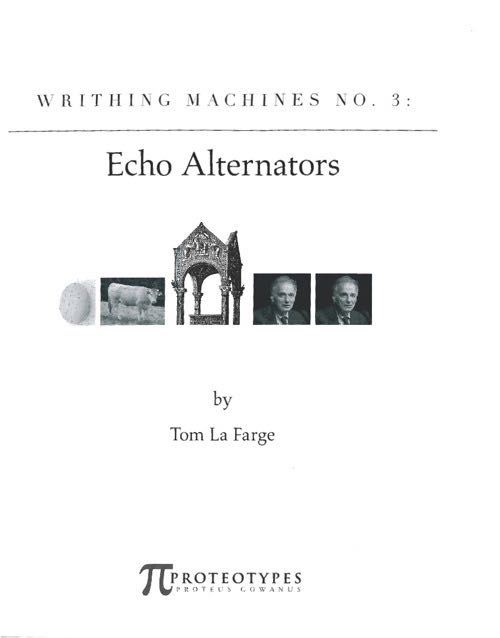
Like the previous volumes in the series, Echo Alternators is a beautifully designed call to action.
Recent reading
— Kevin Telfer. Peter Pan’s First XI. The Extraordinary Story of J. M. Barrie’s Cricket Team . Sceptre paperback, [2010]. A delightful and engaging book, gift of [MB], recounting the history of author J. M. Barrie’s pre-War cricket team, whose talented members included ca. 1903 P. G. Wodehouse, Sir Arthur Conan Doyle, A. W. Hornung, and A. E. W. Mason ; and at other times A.A. Milne, Jerome K. Jerome, etc., etc. The web of personal relations is vast : Barrie was godfather to polar explorer Robert Scott’s son, and the final match played by Barrie’s team in the summer of 1913 was held on the grounds of Downe House in Kent, Darwin’s house, then in use as a girl’s school.
There was laughter in that last match, and superb exhibitions of incompetence ; but henceforth there would only be memories in the summers that still remained.
[An afterthought : as this biography advances in forced marches toward the autumn of 1914, I am reminded of various novels treating the long summer of the late Victorian and Edwardian periods, such as The Shooting Party by Isabel Colegate or A.S. Byatt’s The Children’s Book . The Good Soldier (1915) by Ford Madox Hueffer (Ford Madox Ford) is the archetype for these recitations of the inevitability of upper-class dissolution ; it has the further advantage of being a contemporary witness.]
— Ian Rankin. Doors Open . [2008 ; Reagan Arthur/Back Bay Books paperback, 2010]. Misadventures of art thieves in Edinburgh, a deftly orchestrated sleight of hand and a falling out among thieves ; lacking something of the wiry toughness and intensity that was always to be found in the Rebus novels. [Note that this is not to be interpreted as a call for more in the same series ; rather a wish that the author finds a mode that will display similar levels of engagement.]
‘ The Mascarons of the Late Empire & Other Studies ’ and other Stories
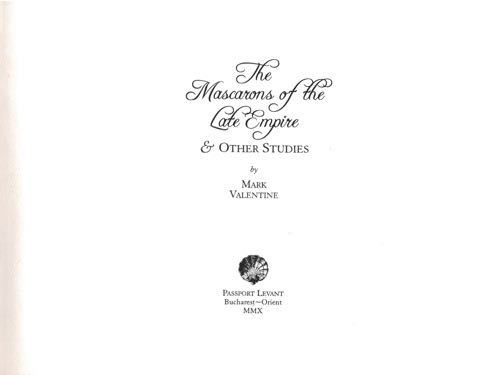
— Mark Valentine. The Mascarons of the Late Empire & Other Studies . Passport Levant, 2010. Color frontispiece after a postcard of Czernowitz, 1923. Edition of 100 numbered copies. Red cloth, upper cover stamped in gilt. Black dust jacket printed in black, spine panel titled in gilt.
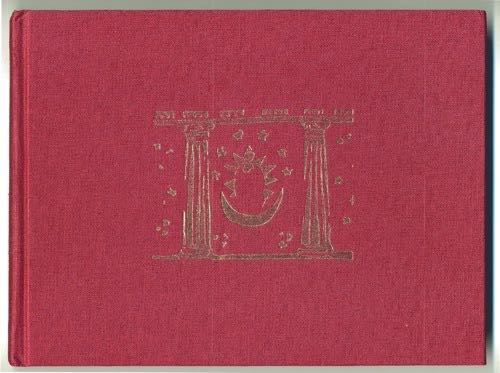
The Mascarons of the Late Empire & Other Studies is a superbly produced new collection of four fantasies of Balkan history by Mark Valentine, published with an imprint even more exotic than The Night-Farers , one of last year’s delights. Valentine’s principal mode is the search for aesthetic objects and philosophical traditions, and his tales bring the reader to small side streets in remote cities. Above the mantlepiece in a small house in “A Walled Garden on the Bosphorus ” is a sepia photograph : “ It showed a stretch of sea and then billowing illumined clouds rising above a city whose outline was now jagged and haphazard. In the lower left corner there was a caption in white text : it read, ‘ The Doom of Smyrna ’. . . . Constantinople had suffered none of the fire and destruction whose bloom the photographer had caught : it had become, indeed, a place of refuge. Its doom, perhaps, was a slower fate : the encroachment of twilight. ”
Valentine has a talent for creating images resonant with history and implication ; the tone is often elegiac but the precision of his observations and the sure movement of story counterbalances any tendency to preciousness. The title story is a journey through a labyrinth that includes a memorable tour through the Night Market ; “ A Lantern for Carpathia ” is a wonder, a beautiful story in which a scholar researching a preposterous cultural topic travels into the woods and finds rather more than he expected ; the political and historical resonances are vast, and deftly understated.
“ The Atelier in Iasi ” follows an Englishman of modest private means, resident in Romania and arrogant in his informed superiority, when he receives a cryptic invitation to a private view in a provincial city. The cadences of the walk through Iasi and his arrival in the atelier are perfect, and the transformation in the Englishman’s consciousness that occurs as he settles to his task of exploring “ the rich and rare topography of a room ” is a marvel, fully earned and carefully charted. “ The Atelier in Iasi ” is a brilliant modern fantasy which I hope will soon find a wider readership than this small sumptuous printing can accomplish. (These brief notes form part of a longer review of books by Mark Valentine.)
The jacket is printed in black on black, a very subtle image of a “ Mascaron of a Dying Empire, Portrait in a July Night ” (detail below, created in August sunlight).
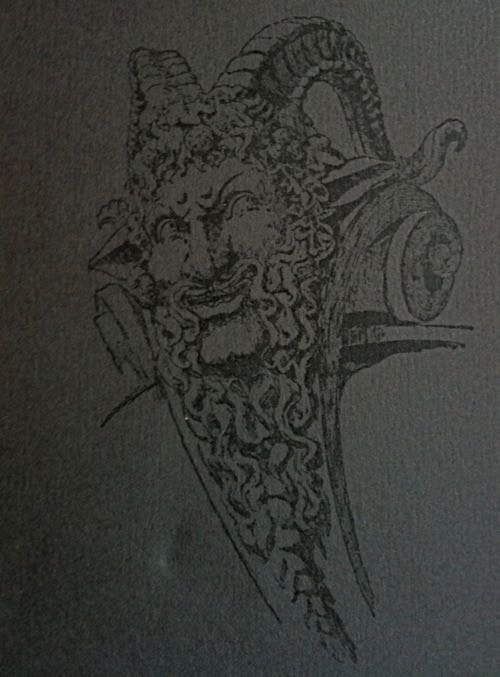
My copy of The Mascarons of the Late Empire & Other Studies bears a presentation inscription from the author ; its arrival in the mail was a surprise and a great pleasure.
Recent reading
— The Burning Leg. Edited by Duncan Minshull. Hesperus Press, 2010. Short collection of “ walking scenes from classic fiction ” as the half-title reads, with a foreword by Will Self that strides from Rousseau, “ who observed that we think at a walking pace ” to Australia by way of Dartmoor and recollections of walks with his father. Th selections are an interesting mix, passages of varying lengths on many different aspects of walking from Defoe and Dickens to Austen, Tolstoy, and Zola. Curiously, the three longest pieces are American stories (less well known to British readers, perhaps), Poe’s “ The Man of the Crowd ”, Hawthorne’s “ Young Goodman Brown ”, and London’s “ To Build a Fire ”. The prose cognate of James Walsh’s Solvitur ambulando (Left Hand Books, [2002]).
4 September 10
‘ Once a wood, always a wood. ’
— Sylvia Townsend Warner. Lolly Willowes or the Loving Huntsman . Chatto & Windus, 1926. [iv], 246, [2] pp. Blue cloth, printed spine label.
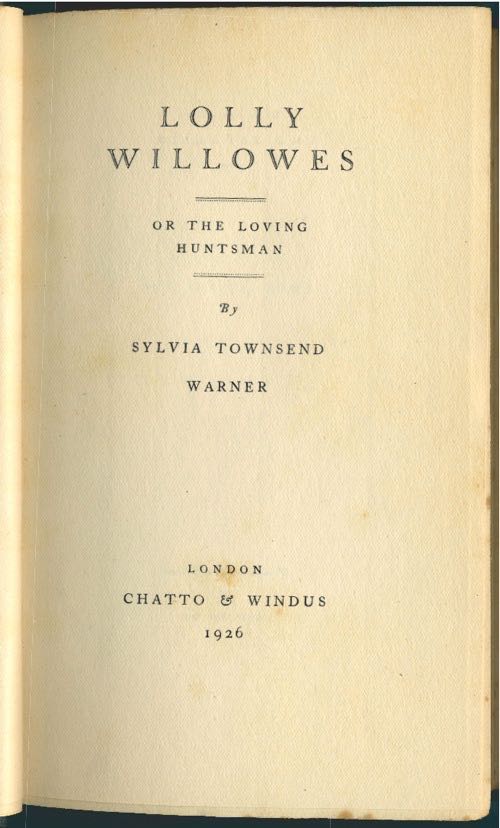
Lolly Willowes is a book that starts from a very respectable, constricted world and goes somewhere surprising and yet the book is so well constructed that the process is effortless and inevitable ; the change in Laura “ Lolly ” Willowes is no less amazing for being so organic. There are key sentences that will make the attentive reader sit up, as when (p. 6) her niece, who “ drove a lorry for the government, and married again from patriotic motives, ” says:
‘ How unenterprising women were in the old days ! Look at Aunt Lolly. Grandfather left her five hundred a year, and she was nearly thirty when he died, and yet she could find nothing better to do than to settle down with Mum and Dad, and stay there ever since. ’
Warner finds images to express the shape of the spinster’s life: “She actually had a sensation that she was stitching herself into a piece of embroidery with a good deal of background” (46). And then on page 57 it is obvious that the book is about to take flight. Now it begins , I thought, at Lolly’s dinner conversation with a man invited to dinner by her brother :
Mr. Arbuthnot certainly was not prepared for her response to his statement that February was a dangerous month. ‘ It is, ’ answered Laura with almost violent agreement. ‘ If you are a were-wolf, and very likely you may be, for lots of people are without knowing, February, of all months, is the month when you are most likely to go out on a dark windy night and worry sheep ’ (57-8).
Lolly has left behind all that was familiar and rooted and natural : “ The knowledge that she was now a visitor where she had formerly been at home seemed to place a clear sheet of glass between her and her surroundings [ . . .] she had said good-bye so irremediably that she could never really come there again ” (62-3). At first the dissatisfaction with the narrow confines of her life is indefinable and thus unalterable : “ Her mind was groping after something that eluded her experience, a something that was shadowy and menacing, and yet in some way congenial ; a somethng that lurked in waste places, that was hinted at by the sound of water gurgling through deep channels and by the voices of birds of ill-omen ” (76-7).
Her resolution to take lodgings in the Shropshire village of Great Mop is an act of insufferable rebellion, and yet she carries it off, escaping the close control inherent in her living as a dependent in her brother’s house. Some people want to know who slept with whom during the 1920s ; I would much rather learn who was reading whose book (sometimes it amounts to the same thing). There was something new in the British intellectual climate in the 1920s, easy enough to state ; the question that occurs to this reader is, could Virginia Woolf have written A Room of One’s Own (1929, from lectures given in late 1928) without the precedent that is Lolly Willowes ?
Lolly enjoys village life without feeling closely connected, until the crisis occurs. Her nephew Titus comes and decides to stay : “ He loved the countryside as though it were a body. [ . . .] The green lap was comfortable ” (160-1). It is control reasserting itself over her circumstances. “ They were come out to recapture her, they had tracked her down and closed her in. [ . . .] They were all leagued against her. ” (163-4). Only a small, empty field at the edge of a wood was left to her, and in that place she refuses.
‘ No ! ’ she cried out, wildly clapping her hands together. ‘ No ! You shan’t get me. I won’t go back. I won’t. . . . Oh ! Is there no help ? ’[ . . .] There was no answer. And yet the silence that had followed it had been so intent, so deliberate, that it wass like a pledge. If any listening power inhabited this place ; if any grimly favorable power had been evoked by her cry ; then surely a compact had been made and the pledge irrevocably given (164-5).
She must endure a few more constricting twists before she breaks free. Aunt Lolly meekly agrees to act as her nephew’s scribe when he injures his writing hand.
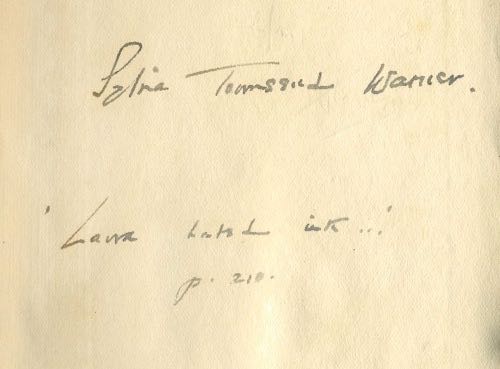
Laura hated ink, she marvelled that any one should have the constancy to write a whole book. She though of Paradise Lost with a shudder, for it required even more constancy to write some one else’s book. Highly as she rated the sufferings of Milton’s daughters, she rated her own even higher, for she did not suppose that they had to be for ever jumping up and down to light the poet‘s cigarette ; and blank verse flowed, flowed majestically, she understood, from his lips, whereas Titus dictated in prose, which was far harder to punctuate (210).
There is a comic twist and yet nothing is extraneous. And when the change comes it is as utter and irrevocable as her pledge. It is the world awakening, and Lolly awakening (always with her customary reserve). The subtle events in the empty field — “ The chance contact with a briar or a tall weed sent drowsy tinglings through her flesh ” (165) — are mirrored in the abandon of the midnight dance in the hilltop field.
Laura liked dancing with Emily ; the pasty-faced and anaemic young slattern whom she had seen dawdling about the village danced with a fervour that annihilated every misgiving. They whirled faster and faster, fused together like two suns that whirl and blaze in a single destruction. A strand of the red hair came undone and brushed across Laura’s face. The contact made her tingle from head to foot (192).
The passage on pp. 230-1, beginning “ Once a wood, always a wood ” recapitulates the arc of the book and, indeed, the arc of the first quarter of the twentieth century. “ Wolves howled through the streets of Paris, the foxes played in the throne-room of Schönbrunn . . . ” might seem hackneyed to a twenty-first century reader ; the image was neither stale nor remote in 1926.
The discourse upon women in British society is simply brilliant. “ ‘ Women have such vivid imaginations, and lead such dull lives. Their pleasure in life is so soon over [. . .] they are like trees towards the end of summer, heavy and dusty, and nobody finds their leaves surprising, or notices them till they fall off. If they could be passive and unnoticed, it wouldn’t matter. But they must be active, and still not noticed. Doing, doing, doing, till mere habit scolds at them like a housewife, and rouses them up — when they might sit in their doorways and think — to be doing still ! ’ ” Lolly Willowes , charting an escape from the restrictions of class and society, is why one reads a novel : intellectual and cultural issues articulated in the dance of form and image.
My thanks to [EK] at whose suggestion I sought out this astonishing, delightful book.

My copy of Lolly Willowes illustrated above, signed with a wry extract from the text, once formed part of the library of author Frederic Prokosch, a complicated figure in Anglo-American letters. From the University of Delaware llibrary website :
http://www.lib.udel.edu/ud/spec/exhibits/forgery/proksch.htm
Frederic Prokosch is remembered today primarily as the author of a number of well-received novels and as a minor poet of some note. What is less well known is that he was also an accomplished forger. . . .
3 September 10
He and She ; or, Feminism & a Theatre of Calamity
A brief visit to the Pforzheimer Collection at the New York Public Library yesterday, to look at copies of Mary Wollstonecraft’s A Vindication of the Rights of Woman (1792) — there are four ( ! ) copies in the collection, including a beautiful uncut copy as issued in drab blue boards with a pink paper spine. Opened to page 47 :
Women are, therefore, to be considered either as moral beings, or so weak that they must be entirely subject to the superior faculties of men.
And later on the same page, after outlining a position taken by Rousseau, she writes : “ What nonsense ! ” This work is toward the top of the list of Books to Be Read : time to get reading. The lives of Mary Wollstonecraft and William Godwin were complex and rich in intellectual engagement ; and also genuinely tragic. She died in 1797 as a result of puerperal fever following the birth of their daughter, Mary, and Godwin was left, disconsolate, with her two children to raise.
I also took the opportunity to look at William Godwin’s novel, Things as They Are; or, The Adventures of Caleb Williams (1794) :
This also has long been on my list of Books to Be Read and after reading the opening sentence I moved it to the very top :
My life has for several years been a theatre of calamity. . . .
‘ Once a wood, always a wood. ’
— Sylvia Townsend Warner. Lolly Willowes or the Loving Huntsman . Chatto & Windus, 1926.
Have just finished reading this excellent book, at the suggestion of a friend. Lolly Willowes will be the subject of the next post.
Recent reading :
— Stephen Duncombe. Notes from Underground. Zines and the Politics of Alternative Culture (1997 ; Microcosm paperback, 2008)
A great topic, but a book that is almost impossible to read because of decisions of typography and design (the full-size picture is somewhat deceptive, as it seems to function better on-screen than in the hand). Duncombe’s afterword for the new edition, discussing the distinction between ’zine activity of the early 1990s (when Temporary Culture was a photocopy ’zine) and the internet, is particularly interesting and full of implications for in culture and politics : “ The world of self-publishing on the internet is not an alternative culture . . . no cultural price of admission into the digital realm. ” And especially : “ a multiplicity of voices and values . . . . But this diversity does not constitute a community. ”
Wander in the Archives
The Archives of the Endless Bookshelf have been swept and tidied and a guide has been prepared to assist wanderers. Index would be too strong a term : the headwords tend to be suggestive rather than directive. Start here. Have fun.
This creaking and constantly evolving website of the endless bookshelf : I expect that some entries will be brief, others will take the form of more elaborate essays, and eventually I will become adept at incorporating comments or interactivity. Right now you’ll have to send links to me, dear readers. [HWW]
electronym : wessells
at aol dot com
Copyright © 2007-2010
Henry
Wessells and individual contributors.
Produced by Temporary
Culture, P.O.B. 43072, Upper Montclair, NJ 07043 USA.


